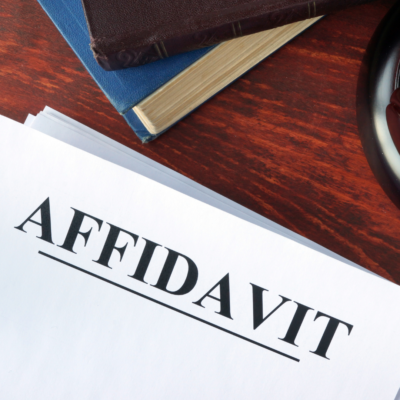If you’ve ever been asked to write an affidavit, you might not know what that means or where to start.
An affidavit is a written legal document that contains facts, information, and a series of statements that a person swears are true. The affidavit is used along with witness statements to prove the truthfulness of a person’s comments in court.

In Canada and Alberta, affidavits can be written for sexual assault or rape cases, family court applications after leaving an abusive relationship, and more. An affidavit is a good option for those individuals wanting to provide their evidence to the judge instead of testifying in court, which can be an emotional and nerve-wracking experience.
When writing your affidavit, it’s important to remember that everything stated must be true facts.

What to include in an affidavit:
- The front page must include your full name and the date you swear the affidavit.
- You must include where you live. For example: “I, Sara Smith, from the City of Edmonton am making this affidavit…”
- Your affidavit must be written in first person. Example: “I am seeking financial compensation of…”
- You must sign and swear your affidavit in front of a commissioner of oaths or a notary public for it to be valid. It must state when, where and in front of whom it was sworn and the commissioner or notary must also sign it.
- Your affidavit should only include facts and truthful information that can be supported with evidence. Make sure to include all relevant details in your application. If the case does go to court, you will only be able to tell the judge the facts included in your affidavit.
- Include any relevant additional documentation in the exhibit section of your affidavit. This may include text messages or emails, for example.
Other things to note when writing your affidavit:
- Print or write on only one side of the paper. The court will not accept double-sided documents.
- All paragraphs in your affidavit must be numbered.
- Avoid writing your affidavit in a way that suggests a theory, suggestion or belief.
Depending on your situation, additional specific information may be necessary to fulfill the affidavit and meet any legal requirements.
Once your affidavit is signed, witnessed, and notarized correctly, it is then considered a valid legal document. Although an affidavit can be written on your own, it is recommended that you work with a lawyer who can provide guidance and suggestions as to what should be included.
If you need help writing an affidavit, reach out to our team at McGuiness Law or call us toll free at 1-833-585-4145.